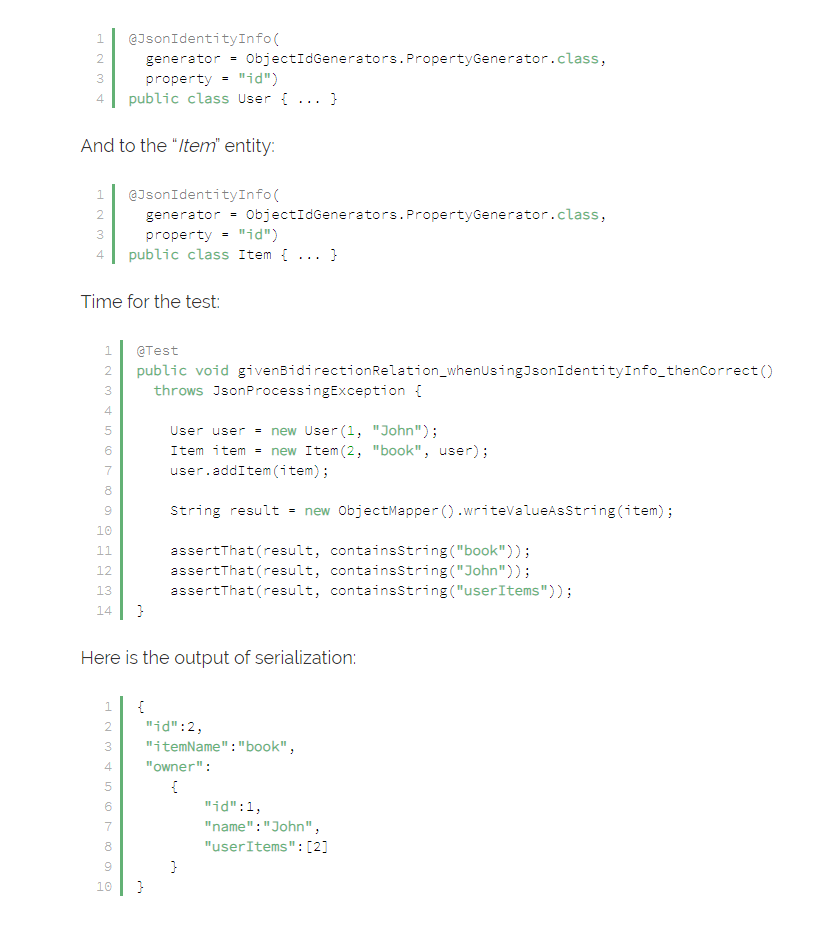This is my District Controller, when I try to fetch data after saving I get the error, even when I try get object form getDistrict(Long id) the same strikes please suggest some way, am very new at spring environment:
package com.gad.services;
import java.util.List;
import org.springframework.beans.factory.annotation.Autowired;
import org.springframework.stereotype.Service;
import com.gad.repositories.DistrictMasterRepositories;
import com.gad.rmodels.Districtmaster;
import com.gad.rmodels.Statemaster;
@Service
public class DistricMasterServices {
@Autowired
DistrictMasterRepositories districtMasterRepositories;
@Autowired
StateMasterServices stateMasterServices;
List<Districtmaster> districtmaster;
public Iterable<Districtmaster> savenewdistrict(Long id,Districtmaster districtmaster_rec){
System.out.println(id);
Statemaster statemaster=null;
statemaster = stateMasterServices.getStateById(id);
System.out.println("savenewdistrict");
districtmaster_rec.setStatemaster(statemaster);
districtMasterRepositories.save(districtmaster_rec);
Iterable<Districtmaster>districtmaster2 = districtMasterRepositories.findAll();
return districtmaster2;
}
public Districtmaster getDistrict(Long id){
Districtmaster districtmaster = districtMasterRepositories.findOne(id);
return districtmaster;
}
}
The model class for state:
package com.gad.rmodels;
import static javax.persistence.GenerationType.SEQUENCE;
import java.util.HashSet;
import java.util.Set;
import javax.persistence.CascadeType;
import javax.persistence.Column;
import javax.persistence.Entity;
import javax.persistence.FetchType;
import javax.persistence.GeneratedValue;
import javax.persistence.Id;
import javax.persistence.OneToMany;
import javax.persistence.SequenceGenerator;
import javax.persistence.Table;
/**
* Statemaster generated by hbm2java
*/
@Entity
@Table(name="statemaster"
,schema="aop_gad_v1"
)
public class Statemaster implements java.io.Serializable {
private long id;
private String stateName;
private Set<Districtmaster> districtmasters = new HashSet<Districtmaster>(0);
public Statemaster() {
}
public Statemaster(long id) {
this.id = id;
}
public Statemaster(long id, String stateName, Set<Districtmaster> districtmasters) {
this.id = id;
this.stateName = stateName;
this.districtmasters = districtmasters;
}
@SequenceGenerator(name="generator_statemasterid", sequenceName="aop_gad_v1.gad_statemaster_seq")
@Id
@GeneratedValue(strategy=SEQUENCE, generator="generator_statemasterid")
@Column(name="id", unique=true, nullable=false)
public long getId() {
return this.id;
}
public void setId(long id) {
this.id = id;
}
@Column(name="state_name", length=20)
public String getStateName() {
return this.stateName;
}
public void setStateName(String stateName) {
this.stateName = stateName;
}
@OneToMany(cascade=CascadeType.ALL, fetch=FetchType.LAZY, mappedBy="statemaster")
public Set<Districtmaster> getDistrictmasters() {
return this.districtmasters;
}
public void setDistrictmasters(Set<Districtmaster> districtmasters) {
this.districtmasters = districtmasters;
}
}
Distric model:
package com.gad.rmodels;
import static javax.persistence.GenerationType.SEQUENCE;
import java.util.HashSet;
import java.util.Set;
import javax.persistence.CascadeType;
import javax.persistence.Column;
import javax.persistence.Entity;
import javax.persistence.FetchType;
import javax.persistence.GeneratedValue;
import javax.persistence.Id;
import javax.persistence.JoinColumn;
import javax.persistence.ManyToOne;
import javax.persistence.OneToMany;
import javax.persistence.SequenceGenerator;
import javax.persistence.Table;
/**
* Districtmaster generated by hbm2java
*/
@SuppressWarnings("serial")
@Entity
@Table(name="districtmaster",schema="aop_gad_v1")
public class Districtmaster implements java.io.Serializable {
private long id;
private Statemaster statemaster;
private String districtName;
private Set<GadGuestHouseMaster> gadGuestHouseMasters = new HashSet<GadGuestHouseMaster>(0);
public Districtmaster() {
}
public Districtmaster(long id) {
this.id = id;
}
public Districtmaster(long id, Statemaster statemaster, String districtName, Set<GadGuestHouseMaster> gadGuestHouseMasters) {
this.id = id;
this.statemaster = statemaster;
this.districtName = districtName;
this.gadGuestHouseMasters = gadGuestHouseMasters;
}
@SequenceGenerator(name="generator_districtmasterid", sequenceName="aop_gad_v1.gad_districtmasterid_seq")
@Id
@GeneratedValue(strategy=SEQUENCE, generator="generator_districtmasterid")
@Column(name="id", unique=true, nullable=false)
public long getId() {
return this.id;
}
public void setId(long id) {
this.id = id;
}
@ManyToOne(fetch=FetchType.LAZY)
@JoinColumn(name="district_of_state")
public Statemaster getStatemaster() {
return this.statemaster;
}
public void setStatemaster(Statemaster statemaster) {
this.statemaster = statemaster;
}
@Column(name="district_name", length=20)
public String getDistrictName() {
return this.districtName;
}
public void setDistrictName(String districtName) {
this.districtName = districtName;
}
@OneToMany(cascade=CascadeType.ALL, fetch=FetchType.LAZY, mappedBy="districtmaster")
public Set<GadGuestHouseMaster> getGadGuestHouseMasters() {
return this.gadGuestHouseMasters;
}
public void setGadGuestHouseMasters(Set<GadGuestHouseMaster> gadGuestHouseMasters) {
this.gadGuestHouseMasters = gadGuestHouseMasters;
}
}
The Error I get:
[{"timestamp":1512641978311,"status":200,"error":"OK","exception":"org.springframework.http.converter.HttpMessageNotWritableException","message":"Could not write JSON: Infinite recursion (StackOverflowError); nested exception is com.fasterxml.jackson.databind.JsonMappingException: Infinite recursion (StackOverflowError) (through reference chain: com.gad.rmodels.Statemaster[\"districtmasters\"]->org.hibernate.collection.internal.PersistentSet[0]-

